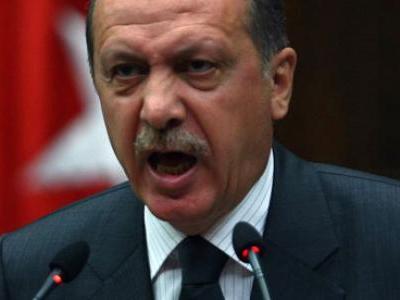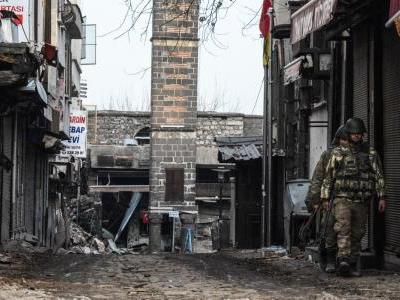Wed, 07/20/2016 - 23:16
Erdogan rises from ordinary autocrat to a very good one
That Bashar al-Assad and Recep Tayyip Erdogan, they manage to get the scenarios they want. You can argue about whether they willfully hatched the plots or are just skillfully exploiting the situation. But in the end, they get what they’ve long railed against, in a perfect example of wish fulfillment, and it always works to their advantage.
That’s the difference between a good autocrat and an ordinary one.
Shortly after the Syrian uprising broke in 2011, Assad was quick to brand the opposition as “terrorists” and lump them all in the dangerous Islamists slot. Then ISIS [or the Islamic State group] emerged after Assad employed the standard endangered dictator practice of opening the prisons and releasing the criminals and takfiris.
Et voila! We’re now obsessed with the fight against the terrorists, and in many parts, outside Assad-detesting Sunni circles, the dictator in Damascus is more palatable than the Islamists of varying stripes left in the ring.

In Erdogan’s case, the lines are still blurry. I’m not, for a minute, saying Erdogan and his AK Party men were responsible for the coup. There are plenty of interest groups who could have done that. You just have to chat with an average Turk (and I’m not talking about the elite, English-speaking Turks that befriend Europeans and Americans) to encounter a rich array of conspirators: Kemalist nationalists, Grey Wolves, communists, Gulenists, PKK splinter groups, rogue security squads, Mossad, the CIA…Turkey can be very Middle Eastern that way. An online poll by the pro-government, English language Daily Sabah newspaper today had 78% agreeing with allegations that the US had supported the “Gulenest coup attempt”.
We’ll have to wait and watch for the coup bid whodunit to unfold. Given the number of arrests and suspects, that’s going to be a nightmare process, which will make the infamous Ergenekon trials -- with its hundreds of suspects and thousands of pages of indictments -- seem like a cakewalk.
The Ergenekon trials -- a lengthy affair targeting military officers and intellectuals allegedly linked to a clandestine secularist organization -- began back in 2008. More than eight years ago, Erdogan was so convinced that a network of retired military officers and secular opponents were out to overthrow him, he unleashed a legal farce that has dragged on for years without uncovering any proof of the existence of a conspiracy to oust Turkey’s neo-Sultan. In April, Turkey’s highest appeals court quashed Erdogan’s coup plot assertions when it threw out convictions against 275 people.
That didn’t shake Erdogan’s conviction that his enemies were out to get him and it underscored his steady campaign against any and all domestic opposition.
But now that he has an actual coup attempt to brandish around, the purge is reaching farcical proportions – if only it was not so serious.
Goodbye teachers, deans and any hopes for an independent judiciary
Erdogan says Fethullah Gulen is responsible for the coup bid. The Pennsylvania-based cleric has denied it. Washington DC is now caught in a delicate diplomatic dance of placating Ankara, trying to cool off the hot-headed man from Kasimpasa -- the hardscrabble Istanbul neighborhood of Erdogan’s childhood that has framed his irascible personality -- while juggling extradition calls.
Meanwhile the daily purification of civil society, the civil services and private sector ranks continues at a frenetic pace, leaving little or no time to digest the effects of the purges.
At last count, over 50,000 military officials, local administrators and civil servants had been fired or suspended, belying claims that the government is only targeting the Gulenists.
The way Turkish authorities have trained their sights on the education sector, firing or suspending thousands of education ministry employees, university deans and schoolteachers, has sparked fears that the government is targeting Kemalist, and not Gulenist, values.
The justice system -- one of the biggest and most overlooked victims of Erdogan’s power concentration drive – has also taken a massive whack. The judicial purge began years ago, around the time a corruption probe was launched against Erdogan and his clique of associates, family and business friends in 2013.
Now, more than 2,700 judges have been dismissed and the president has even struck the constitutional court, the one institution that stood up to him and reversed some of his edicts.
The government is not even pretending the judiciary can or should be independent. If Brussels had any morals or imagination, it could use the latest flagrant violations as an excuse to scrap the EU’s controversial refugee deal with Turkey and do the right thing by sharing the migrant load between EU members. But Brussels has neither morals nor imagination when it comes to migrants and especially not when German Chancellor Angela Merkel has a history of kowtowing to Turkey’s testosterone-charged strongman.
So many lives disrupted, so many families wondering how -- and whether -- the next paycheck will arrive. At this rate, Turkey’s unemployment figures will rise as the economy takes a dive.
And we haven’t even got to the security implications.
A military in crisis is not the best coalition ally
Turkey is the bridge that links Europe and Asia. NATO’s only Muslim-majority member nation reportedly houses tactical nuclear weapons, which Washington neither confirms nor denies, but is widely believed to be the case. It has a nearly 900-kilometer border with Syria and on the other side of the frontier, ISIS has carved out its so-called caliphate. Turkish security forces are also locked in a bruising military operation against the PKK (Kurdistan Workers’ Party) after Erdogan scrapped a peace deal with the group in a successful bid to win the 2015 elections.

The military operations against the PKK has turned southeastern Turkish cities and towns such as Diyarbakir and Suruc into war zones. Meanwhile ISIS attacks in Turkey are growing in scale and audacity, with the latest targeting Istanbul’s Ataturk Airport.
Turkish security forces are under fire and they were stretched thin before the July 15 coup attempt. On a recent trip to Kilis, the border town that was once the gateway for ISIS fighters of every nationality, a Turkish military intelligence officer bitched and moaned to us about his hardship posting in a crappy town in a crappy part of the country.
Now there’s an ongoing witch-hunt targeting the armed services and the Turkish military is caught up in its own drama.
US military officers are watching their Turkish counterparts -- with whom they have cooperated in NATO missions -- being raked over the coals. Out of 118 detained generals and admirals, 99 have been formally arrested. The atmosphere in the armed services is sulphurous, with senior commanders having to prove and show their loyalty. In the lower ranks, it’s worse, with thousands in custody and photographs of troops bruised and wounded surfacing.
Erdogan has told Al Jazeera that only a minority of the armed forces were involved in Friday’s coup. But the troop detentions have been sweeping and it has sparked an atmosphere of heightened suspicions, with all sorts of rumors making the rounds. On Wednesday, Turkish F-16s did a surveillance of coastguard boats following reports that rebel soldiers had “hijacked” a vessel to flee to Greece. Nerves are fraying out there and Turkey’s military men are jumpy as their civilian bosses are on crackdown overreach.
Let’s just say this is not the state you’d like to find your military allies in a coalition against anything.
ISIS chiefs must be watching all of this with glee and the situation had better settle down before some cell in some Turkish town or city decides to take advantage of this security mess.
How all these hundreds of senior officials and thousands of lower level troops are about to be replaced is anyone’s guess. But it won’t happen soon and we can only hope they will be replaced by competent candidates and not just loyalists recruited for their unquestionable love of the AK Party.
Turkey, it need hardly be stressed, is not in a good place today. Erdogan is dragging the country into even more explosive terrain. The Turkish lira has hit record lows, Standard & Poor’s has cut the country’s foreign currency credit rating, tourism – which took a hit earlier this year – will be further affected, the Istanbul-based expatriate community is packing its bags as we speak, and academics are busy cancelling upcoming seminars in Turkish cities even as Turkish academics abroad are wondering what to do.
Turkey’s neo-sultan has now swung his sights on Gezi Park, promising to build up the Istanbul landmark “whether they want it or not”. The ones who don’t want it make up the 48% of Turks who did not vote for Erdogan’s party in the 2015 election and that’s a volcano just waiting to erupt again.
Welcome a new state of emergency
And now, in a late night address to the nation Wednesday, Erdogan has announced a three-month state of emergency. We’ll have to watch if this state of emergency gets prolonged, as it has in France since early 2015.
The signs are not looking good: in his interview with Al Jazeera shortly before the state of emergency announcement, Erdogan noted that the suspensions and arrests have not “come to an end” and he voiced concern that the failed putsch may not have been "the end of coup attempt".
When threats don’t “come to an end,” emergency laws get stretched for years, sometimes decades. We’ll also have to watch if Turkey’s state of emergency is closer to the one in François Hollande’s France or Abdel Fattah al-Sisi’s Egypt.
The way things are going, I’m putting my bets on the Egyptian scenario. Erdogan and Sisi of course hail from opposite sides of the secularist-Islamist divide. Sisi’s coup succeeded in ousting a democratically elected Muslim Brotherhood leader. Erdogan has succeeded in putting down a military coup, but only to strengthen a Muslim Brotherhood-like autocracy. Assad and Sisi hate the Islamists hailing from the Muslim Brotherhood school. Erdogan loves them as his people and they return his love by re-electing his party. But they are all good at crushing dissent – that’s a basic requirement in the school of autocrats. The trick though is turning a bad scenario to your advantage. The July 15 attempted coup has hauled Erdogan up from the ranks of ordinary autocrat to a very good one indeed.
That’s the difference between a good autocrat and an ordinary one.
Shortly after the Syrian uprising broke in 2011, Assad was quick to brand the opposition as “terrorists” and lump them all in the dangerous Islamists slot. Then ISIS [or the Islamic State group] emerged after Assad employed the standard endangered dictator practice of opening the prisons and releasing the criminals and takfiris.
Et voila! We’re now obsessed with the fight against the terrorists, and in many parts, outside Assad-detesting Sunni circles, the dictator in Damascus is more palatable than the Islamists of varying stripes left in the ring.

In Erdogan’s case, the lines are still blurry. I’m not, for a minute, saying Erdogan and his AK Party men were responsible for the coup. There are plenty of interest groups who could have done that. You just have to chat with an average Turk (and I’m not talking about the elite, English-speaking Turks that befriend Europeans and Americans) to encounter a rich array of conspirators: Kemalist nationalists, Grey Wolves, communists, Gulenists, PKK splinter groups, rogue security squads, Mossad, the CIA…Turkey can be very Middle Eastern that way. An online poll by the pro-government, English language Daily Sabah newspaper today had 78% agreeing with allegations that the US had supported the “Gulenest coup attempt”.
We’ll have to wait and watch for the coup bid whodunit to unfold. Given the number of arrests and suspects, that’s going to be a nightmare process, which will make the infamous Ergenekon trials -- with its hundreds of suspects and thousands of pages of indictments -- seem like a cakewalk.
The Ergenekon trials -- a lengthy affair targeting military officers and intellectuals allegedly linked to a clandestine secularist organization -- began back in 2008. More than eight years ago, Erdogan was so convinced that a network of retired military officers and secular opponents were out to overthrow him, he unleashed a legal farce that has dragged on for years without uncovering any proof of the existence of a conspiracy to oust Turkey’s neo-Sultan. In April, Turkey’s highest appeals court quashed Erdogan’s coup plot assertions when it threw out convictions against 275 people.
That didn’t shake Erdogan’s conviction that his enemies were out to get him and it underscored his steady campaign against any and all domestic opposition.
But now that he has an actual coup attempt to brandish around, the purge is reaching farcical proportions – if only it was not so serious.
Goodbye teachers, deans and any hopes for an independent judiciary
Erdogan says Fethullah Gulen is responsible for the coup bid. The Pennsylvania-based cleric has denied it. Washington DC is now caught in a delicate diplomatic dance of placating Ankara, trying to cool off the hot-headed man from Kasimpasa -- the hardscrabble Istanbul neighborhood of Erdogan’s childhood that has framed his irascible personality -- while juggling extradition calls.
Meanwhile the daily purification of civil society, the civil services and private sector ranks continues at a frenetic pace, leaving little or no time to digest the effects of the purges.
At last count, over 50,000 military officials, local administrators and civil servants had been fired or suspended, belying claims that the government is only targeting the Gulenists.
The way Turkish authorities have trained their sights on the education sector, firing or suspending thousands of education ministry employees, university deans and schoolteachers, has sparked fears that the government is targeting Kemalist, and not Gulenist, values.
The justice system -- one of the biggest and most overlooked victims of Erdogan’s power concentration drive – has also taken a massive whack. The judicial purge began years ago, around the time a corruption probe was launched against Erdogan and his clique of associates, family and business friends in 2013.
Now, more than 2,700 judges have been dismissed and the president has even struck the constitutional court, the one institution that stood up to him and reversed some of his edicts.
The government is not even pretending the judiciary can or should be independent. If Brussels had any morals or imagination, it could use the latest flagrant violations as an excuse to scrap the EU’s controversial refugee deal with Turkey and do the right thing by sharing the migrant load between EU members. But Brussels has neither morals nor imagination when it comes to migrants and especially not when German Chancellor Angela Merkel has a history of kowtowing to Turkey’s testosterone-charged strongman.
So many lives disrupted, so many families wondering how -- and whether -- the next paycheck will arrive. At this rate, Turkey’s unemployment figures will rise as the economy takes a dive.
And we haven’t even got to the security implications.
A military in crisis is not the best coalition ally
Turkey is the bridge that links Europe and Asia. NATO’s only Muslim-majority member nation reportedly houses tactical nuclear weapons, which Washington neither confirms nor denies, but is widely believed to be the case. It has a nearly 900-kilometer border with Syria and on the other side of the frontier, ISIS has carved out its so-called caliphate. Turkish security forces are also locked in a bruising military operation against the PKK (Kurdistan Workers’ Party) after Erdogan scrapped a peace deal with the group in a successful bid to win the 2015 elections.

The military operations against the PKK has turned southeastern Turkish cities and towns such as Diyarbakir and Suruc into war zones. Meanwhile ISIS attacks in Turkey are growing in scale and audacity, with the latest targeting Istanbul’s Ataturk Airport.
Turkish security forces are under fire and they were stretched thin before the July 15 coup attempt. On a recent trip to Kilis, the border town that was once the gateway for ISIS fighters of every nationality, a Turkish military intelligence officer bitched and moaned to us about his hardship posting in a crappy town in a crappy part of the country.
Now there’s an ongoing witch-hunt targeting the armed services and the Turkish military is caught up in its own drama.
US military officers are watching their Turkish counterparts -- with whom they have cooperated in NATO missions -- being raked over the coals. Out of 118 detained generals and admirals, 99 have been formally arrested. The atmosphere in the armed services is sulphurous, with senior commanders having to prove and show their loyalty. In the lower ranks, it’s worse, with thousands in custody and photographs of troops bruised and wounded surfacing.
Erdogan has told Al Jazeera that only a minority of the armed forces were involved in Friday’s coup. But the troop detentions have been sweeping and it has sparked an atmosphere of heightened suspicions, with all sorts of rumors making the rounds. On Wednesday, Turkish F-16s did a surveillance of coastguard boats following reports that rebel soldiers had “hijacked” a vessel to flee to Greece. Nerves are fraying out there and Turkey’s military men are jumpy as their civilian bosses are on crackdown overreach.
Let’s just say this is not the state you’d like to find your military allies in a coalition against anything.
ISIS chiefs must be watching all of this with glee and the situation had better settle down before some cell in some Turkish town or city decides to take advantage of this security mess.
How all these hundreds of senior officials and thousands of lower level troops are about to be replaced is anyone’s guess. But it won’t happen soon and we can only hope they will be replaced by competent candidates and not just loyalists recruited for their unquestionable love of the AK Party.
Turkey, it need hardly be stressed, is not in a good place today. Erdogan is dragging the country into even more explosive terrain. The Turkish lira has hit record lows, Standard & Poor’s has cut the country’s foreign currency credit rating, tourism – which took a hit earlier this year – will be further affected, the Istanbul-based expatriate community is packing its bags as we speak, and academics are busy cancelling upcoming seminars in Turkish cities even as Turkish academics abroad are wondering what to do.
Turkey’s neo-sultan has now swung his sights on Gezi Park, promising to build up the Istanbul landmark “whether they want it or not”. The ones who don’t want it make up the 48% of Turks who did not vote for Erdogan’s party in the 2015 election and that’s a volcano just waiting to erupt again.
Welcome a new state of emergency
And now, in a late night address to the nation Wednesday, Erdogan has announced a three-month state of emergency. We’ll have to watch if this state of emergency gets prolonged, as it has in France since early 2015.
The signs are not looking good: in his interview with Al Jazeera shortly before the state of emergency announcement, Erdogan noted that the suspensions and arrests have not “come to an end” and he voiced concern that the failed putsch may not have been "the end of coup attempt".
When threats don’t “come to an end,” emergency laws get stretched for years, sometimes decades. We’ll also have to watch if Turkey’s state of emergency is closer to the one in François Hollande’s France or Abdel Fattah al-Sisi’s Egypt.
The way things are going, I’m putting my bets on the Egyptian scenario. Erdogan and Sisi of course hail from opposite sides of the secularist-Islamist divide. Sisi’s coup succeeded in ousting a democratically elected Muslim Brotherhood leader. Erdogan has succeeded in putting down a military coup, but only to strengthen a Muslim Brotherhood-like autocracy. Assad and Sisi hate the Islamists hailing from the Muslim Brotherhood school. Erdogan loves them as his people and they return his love by re-electing his party. But they are all good at crushing dissent – that’s a basic requirement in the school of autocrats. The trick though is turning a bad scenario to your advantage. The July 15 attempted coup has hauled Erdogan up from the ranks of ordinary autocrat to a very good one indeed.
Comments or opinions expressed on this blog are those of the individual contributors only, and do not necessarily represent the views of FRANCE 24. The content on this blog is provided on an "as-is" basis. FRANCE 24 is not liable for any damages whatsoever arising out of the content or use of this blog.




0 Comments
Post new comment